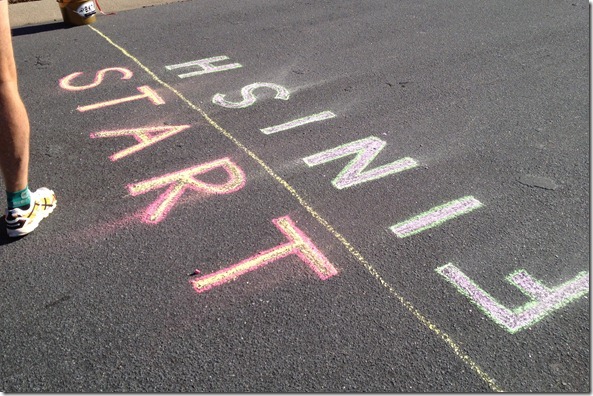Christine wrote, “I just started really getting into running last year. I’m currently in week four of training for my first half-marathon (and first race ever). I’ve been getting pretty discouraged when I have to take walking breaks during my runs, especially since one of the friends I’m doing the race with is a powerhouse and it seems like she just doesn’t get tired and can run forever without stopping, even though we are on similar fitness levels. I try to remind myself that I’m still completing the miles whether I walk a little of it or not, but I’m definitely a perfectionist so I get frustrated with myself and scared that on race day I wont be prepared if I’m not training myself to push through. Do you have any insight on this?â€

I’m excited to hear your feedback for Christine. But first: I’m going to riff on something that seems unrelated to the issue of walking and running, but I promise… it’s not.
What is the yardstick by which you measure yourself? How do you know if you are smart enough, popular enough, fast enough, wealthy enough, successful enough? If you’re worthy? If you’re happy? Is your yardstick defined by emotions, by numbers, by moments? When you think about your yardstick, you’ve got to ask who created it, too. Did you create your own standards? Was it your parents? Your partner? Society at large?
Because of Operation Beautiful, I’ve spent a great deal of the last four years of my life ruminating on this very topic. The yardstick. It’s such a complicated issue, and it’s one that continually morphs and evolves. As every year passes, I look at my yardstick with fresh eyes – “Oh yes, I remember that time that so-and-so said this-and-that to me, and now I can see how it shaped my expectation about money, marriage, friendships, etc.â€
I think we can all agree that self-improvement is a great thing. What is the point of life, after all, if we aren’t seeking new answers and uncovering deeper layers? And perhaps we can also all agree that, inherently, humans are competitive. If you think about the yardstick, it’s pretty obvious that there are two types of standards: ones you create for yourself, and ones you create based on other people’s expectations, accomplishments, and beliefs. Two ways to improve yourself; two ways to craft your yardstick; two ways to be competitive.
I don’t know about you, but I really struggle to think of a single point in my life when being competitive with others was helpful. My yardstick gets fifty degrees of crazy when I become competitive with others. I end up wanting things I don’t need; I ignore the great things that I already have. I feel like I’m not doing ‘enough’ and falling behind. I’m not saying that self-competitiveness is always rosy, either – any type of competitiveness can really go too far. But I think that relying on others to define our yardsticks is a very slippery, and potentially very dangerous, idea.
It’s hard to do, but when we manage to look at at yardstick in a vacuum, without all the influence of outsiders, we can see a path to true balance, joy, accomplishment. So the first thing that I would say to Christine is: Stop worrying about your friend. Stop eyeballing her yardstick and borrowing her definitions of a successful race. Define your own success, trust your training, and know that you can do this.
Because the truth is that there is no single definition of a runner. Runners come in all shapes and sizes. Runners do 5Ks and ultramarathons. Some runners never do a race at all. Runners run without stopping and runners take breaks to walk. Runners sprint and runners jog. Being a ‘runner’ is about getting up and pounding the pavement, day after day, because it makes your heart sing. Most of us run simply because we love it – not because we’re trying out for the Olympics. So why hold yourself to a standard that doesn’t fit your needs?
I’m a runner. I’m a runner who wants to do her personal best and loves to take walking breaks. Maybe some people’s yardsticks wouldn’t deem me a runner, but I know that I am one. After all, walking and working hard aren’t mutually exclusive! Heck, I often end up faster overall because of regular walking breaks. And I approach the finish line with a little extra gas in the tank, allowing me to do the “Whoo hoo!†sprint to the end – that’s always nice.
But much more importantly, walking calms me down and allows me to regroup. I breathe deeply during my walking breaks and think about how I’m doing something great for my body and mind by exercising. It’s hard for me to think about that while running because I’m exerting so much physical energy.
But with walking – I can think. And I like what I think about when I walk. Walking means that I enjoy running more, and therefore, I go running more often. I run happy when I walk. It doesn’t feel like a chore when I don’t force myself to measure up to someone else’s yardstick for what ‘running’ is all about. Running feels like a joy when I do it from the heart, by my rules, following my standards for success. And truthfully, so does the rest of my life.
I’d love to hear your thoughts, too.

Amen! Totally agree. About it all. DEF a runner if you take walking breaks and DEF about the yardstick thing. I think this has become a big issue for me as a new mom too ( the yardstick issue) and something I work through daily. Def going to blog about that soon. BUt re: if you are a runner, I think you are a runner if YOU think you are 🙂